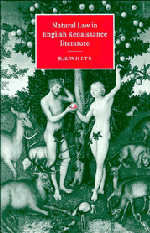Book contents
- Frontmatter
- Contents
- Preface
- Acknowledgments
- 1 Natural Law in history and Renaissance literature
- 2 The heritage of classical Natural Law
- 3 The reception of Natural Law in Renaissance England
- 4 Law and literature in sixteenth-century England
- 5 More's Utopia
- 6 ‘Love is the fulfilling of the law’: Arcadia and Love's Labour's Lost
- 7 ‘Hot temper leaps o'er a cold decree’: The Merchant of Venice and Measure for Measure
- 8 Shakespeare's The History of King Lear
- 9 Milton and Natural Law
- Epilogue: Hobbes and the Demise of classical Natural Law
- Appendix: Aquinas on the right to own private property
- Notes
- Select bibliography
- Index
Appendix: Aquinas on the right to own private property
Published online by Cambridge University Press: 17 September 2009
- Frontmatter
- Contents
- Preface
- Acknowledgments
- 1 Natural Law in history and Renaissance literature
- 2 The heritage of classical Natural Law
- 3 The reception of Natural Law in Renaissance England
- 4 Law and literature in sixteenth-century England
- 5 More's Utopia
- 6 ‘Love is the fulfilling of the law’: Arcadia and Love's Labour's Lost
- 7 ‘Hot temper leaps o'er a cold decree’: The Merchant of Venice and Measure for Measure
- 8 Shakespeare's The History of King Lear
- 9 Milton and Natural Law
- Epilogue: Hobbes and the Demise of classical Natural Law
- Appendix: Aquinas on the right to own private property
- Notes
- Select bibliography
- Index
Summary
Aquinas’ deliberations on the right to own private property provide a good example of his dialectical reasoning which is the same in every section of the Summa Theologica. First he always presents the argument against, usually in three statements:
It would seem that private property is not lawful. For whatever is contrary to the natural law is unlawful. Now according to the natural law all things are held in common, and the possession of property is contrary to this community of goods. Therefore it is unlawful for any man to appropriate any external thing to himself. Secondly, the words of the rich man already quoted are expounded by Basil (Homily on Luke xii, 18) as follows: the rich who reckon that the common goods they have seized are their own properties are like those who go in advance to the theatre excluding others and appropriating to themselves what is intended for common use. Now it would be unlawful to obstruct others from laying their hands on common goods. Therefore it is unlawful to appropriate to oneself what belongs to the community.
Thirdly, Ambrose says, (Sermo lxix, de tempore) and he is quoted in the Decretals: (Dist. xivii) let no man call his own that which is common. That he is speaking of external things appears from the context. Therefore it seems unlawful for a man to appropriate an external thing to himself.
- Type
- Chapter
- Information
- Natural Law in English Renaissance Literature , pp. 252 - 254Publisher: Cambridge University PressPrint publication year: 1996
- 2
- Cited by



